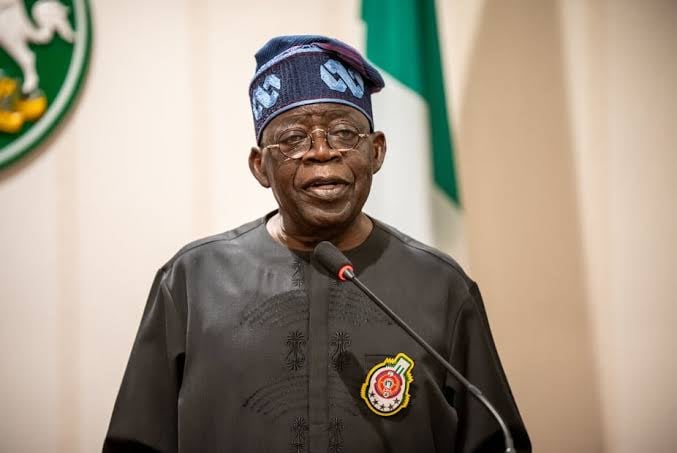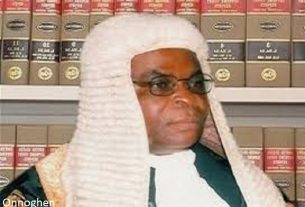President Bola Tinubu. Photo: State House
President Bola Tinubu on Wednesday charged Nigerian editors to uphold integrity and fairness in their reportage, describing responsible journalism as essential to sustaining democracy and national cohesion.
Speaking at the opening of the Nigerian Guild of Editors’ Annual Conference held at the State House, Abuja, on Wednesday, Tinubu said the media must continue to act as a stabilising force in a rapidly changing information environment.
“The freedom secured through struggle is not self-sustaining. It requires constant vigilance and responsible exercise.
“A democracy is sustained not only by elections and laws, but also by the integrity of public conversation,” he stated.
The conference, themed “Democratic Governance and National Cohesion: The Role of Editors,” brought together editors, senior journalists and policymakers to reflect on how the media can strengthen unity amid national challenges.
Tinubu commended the Nigerian press for its historical role in advancing justice and democracy, recalling how journalists “endured intimidation, detention, and personal hardship in defence of the public good.”
He, however, cautioned that the digital age has amplified misinformation, making the editorial function more critical than ever.
The president urged editors to be constructive in their criticism of government policies while maintaining fairness and accuracy.
He urged, “As editors and managers of the national information space, you shape narratives. You influence public understanding. You decide what becomes national focus and how our collective challenges are interpreted. The weight of that responsibility is significant. It must be exercised with wisdom, fairness and a strong sense of national duty.
“Nigeria is a large and diverse country. Debate and differences are part of our reality. However, disagreement must never translate into the erosion of national cohesion. Criticism, when informed and constructive, is a service to the nation. But cynicism that breeds mistrust and despair can weaken the very foundations of the society we all seek to improve. The national interest must always remain paramount.
“We live in a time when information travels rapidly and widely. Social media has made every citizen a potential publisher. This has benefits, but it also increases the speed and scale of misinformation.
“Falsehood can take root before truth has time to speak. In such an environment, the editorial function is more important than ever. Verification must be your anchor; balance must be your principle and professional judgement must be your guide.
“I urge you, therefore, to continue upholding the highest standards of journalism. Report boldly, but do so truthfully. Critique government policy but do so with knowledge and fairness. Your aim must never be to tear down, but to help build a better society.”
Tinubu also reaffirmed his administration’s commitment to economic reforms aimed at long-term stability and prosperity.
“On our part, this administration remains committed to securing our nation, sustaining economic stability and widening the circle of opportunity for all citizens.
“The reforms we have undertaken have been challenging, but they are designed to place our economy on a strong and enduring footing.
“We have taken steps to restore macroeconomic balance, encourage investment and rebuild confidence. The signs of progress are visible in several sectors of the economy. Still, we know there is more work to do, and we remain focused on ensuring that growth translates into real improvements in the daily lives of Nigerians,” he said.
He called for collaboration among the government, the private sector, civil society, and the media to advance national unity.
“However, economic reforms and institutional improvements alone cannot build the Nigeria we seek. Nation-building requires cooperation.
” It requires trust. It requires a shared understanding that our future is tied together. The government has its role. The private sector has its role. Civil society has its role. And the media has a distinct responsibility to help shape a climate of reason and unity,” he urged.
He, however, reminded the editors that their influence extends beyond headlines.
He added, “Distinguished Editors, your work matters. The tone you set in your newsrooms, the standards you enforce, and the courage with which you defend the truth will all help shape the direction of our national journey. Let us carry this responsibility with purpose.”
Tinubu’s call came amid growing concern over the spread of misinformation and the erosion of public trust in the media.
In July, Bauchi State Governor, Bala Mohammed, and the Minister of Information and National Orientation, Mohammed Idris, voiced similar concerns, warning that fake news, misinformation, and disinformation were fast becoming threats to Nigeria’s stability.
Speaking through his Chief of Staff, Aminu Gamawa, at the third Lateef Jakande Annual Memorial Lecture organised by the NGE, Mohammed compared today’s digital challenges to the era of press suppression under colonial and military regimes.
“The digital age has opened the floodgates of information and misinformation. Social media has democratised speech but also diluted truth. Artificial intelligence now creates headlines, but who checks the heart behind them?” he asked.
The governor lamented that editorial independence was increasingly under pressure, as some media houses were tempted to trade truth for the financial influence of politicians and corporate interests seeking to control public narratives.
Similarly, Idris, represented by the Special Adviser to the President on Information and Strategy, Bayo Onanuga, warned that unchecked fake news could ignite social unrest, stressing that the spread of falsehood was “a ticking bomb that could set the nation ablaze.”
The Punch





